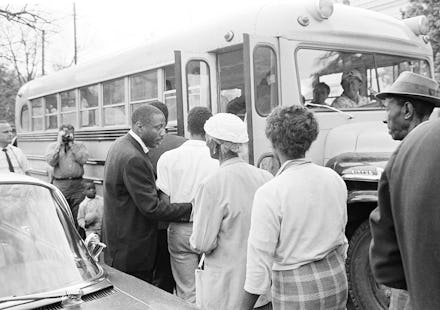SNCC Legacy Project Endorses the Movement for Black Lives Policy Platform

A group of civil rights era activists have passed the torch to a younger generation, so to speak.
One week after the Movement for Black Lives released a wide-ranging, and long-awaited, policy platform, the activists' vision for change has also earned an endorsement from delegates of the Student Nonviolent Coordinating Committee, a famed student organizing group that formed in the 1960s.
In a letter signed by more than 67 former SNCC members, the activists, under the umbrella of the SNCC Legacy Project, wrote that "we of yesterday's SNCC say to today's #BlackLivesMatter, 'Ya'll take it from here!'"
"With their protests and demands, the Movement for Black Lives is continuing to exercise their rights, guaranteed to all Americans under the First Amendment of the United States Constitution," the letter continues. "We, the still-active radicals who were SNCC, salute today's Movement for Black Lives, for taking hold of the torch to continue to light this flame for a knowingly forgetful world."
The letter's signees include Robert "Bob" Moses, the architect behind the civil rights era's famed Freedom Schools, and Berniece Johnson Reagon, founder of the acapella ensemble Sweet Honey in the Rock.
The Movement for Black Lives released its policy platform on Aug. 1. It was collaboratively built over a year of discussions between more than 40 black organizing groups from across the country. At 22 pages long, it includes more than 40 demands, including an end to capital punishment, redistribution of resources from police departments to mental health treatment programs, the right for workers in on-demand tech economies to unionize and divestment from fossil fuels.
SNCC (colloquially pronounced "snick") was a pioneering group of predominantly black activists mostly known for staging lunch counter sit-ins and helping to coordinate 1964's Freedom Summer, which brought dozens of volunteers to rural Mississippi towns to help register black voters. Many of its members would go on to play important roles in American civic life, including former leader Stokely Carmichael (who later adopted the name Kwame Ture) and helped popularize the phrase "black power;" and the late Julian Bond, who would go on to lead the NAACP.
Previous generations of black activists have not always been so kind to the generation that followed them. Rev. Al Sharpton has been sharply critical of the group's "leader full" approach to organizing, which shuns the idea of a traditional movement spokesperson a la Martin Luther King Jr. and the civil rights movement. And former activist Barbara Reynolds penned a critique in the Washington Post in 2015, writing that she supported the modern activists' cause, but "not their approach."
Read more: